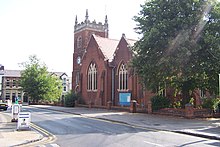|
John le HuntJohn Hunt, le Hunt, Hunter or Hunter del Nash [1] (died after 1351) was an English-born judge who served briefly as Lord Chief Justice of Ireland. He was the ancestor of the prominent Longueville family of Wolverton (which is now part of Milton Keynes).[2] CareerHe was born in Buckinghamshire, son of Nicholas le Hunt of Fenny Stratford.[3] The Nicholas le Hunt of Fenny Stratford who, jointly with his wife Agnes, exercised the right of advowson to present a priest to the living of Walton in 1348, was probably his brother.[4] John himself owned property in Walton, which passed to his descendants, the Longueviĺles or Longvilles.[5] He was a member of the English House of Commons.[5] He accompanied the Justiciar of Ireland, Sir Raoul or Ralph d'Ufford, to Ireland in 1344 and became a justice of the Court of King's Bench (Ireland).[3] The following year he became Lord Chief Justice of Ireland, but served for only a year, and returned to England soon afterwards.[3] We have a record of his attendance in his judicial capacity at least one meeting of the Privy Council of Ireland in 1346.[6] An order in the Close Rolls the same year directs payment to him of £10, in part payment of his salary, which was the then standard £40 per annum.[7] Family He married Margaret (or Margery) de Wolverton, daughter and eventual co-heiress of Sir John de Wolverton junior of Wolverton and his second wife Joan.[3] They had one daughter, Joan, who married John Longueville of Billing, Northamptonshire.[8] John was probably a son or brother of Sir George de Longueville, "chevalier", who was murdered in 1357. The Crown was sufficiently concerned about the killing to set up a judicial commission of inquiry, headed by William de Notton, who was himself to be Lord Chief Justice of Ireland from 1361 to about 1365, but its outcome is unclear.[9] John and Joan were the grandparents of George Longville (c.1386-1458), MP for Buckinghamshire.[5] Le Hunt was still alive in 1351 when, on the death of her brother Ralph, an infant of four, his wife Margaret and her sister Joan jointly inherited the Wolverton estates; these passed to John and Margaret's daughter Joan, and by descent, into the Longueville family (later generations used the spelling Longville), who remained at Wolverton until 1712.[10] After Hunt's death, his widow remarried three times: firstly to Roger de Louth, then to Richard Imworth, and finally to John Howes; but she is not known to have had any further children by her later husbands. References
|